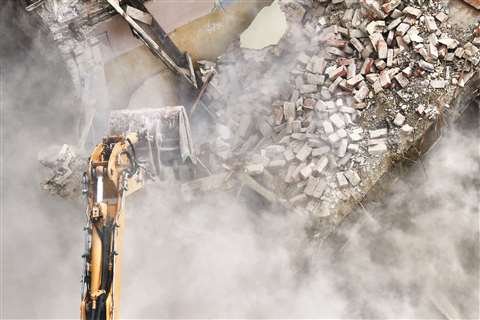Demolition contractors fined almost £60 million for bid rigging
24 March 2023
Following an investigation by the United Kingdom Competition and Markets Authority (CMA), 10 companies have been fined a total of nearly £60 million (US$ 73.92 million) for illegally colluding to rig bids for demolition and asbestos removal contracts.
The CMA has also secured the disqualification of three directors of firms involved in the unlawful conduct. The bid rigging conduct relates to 19 contracts worth more than £150 million ($184.8 million), across both the public and private sectors.
 The CMA said the construction industry is key to UK prosperity and it wants to see a competitive marketplace. Photo: Maciej Bledowski - stock.adobe.com
The CMA said the construction industry is key to UK prosperity and it wants to see a competitive marketplace. Photo: Maciej Bledowski - stock.adobe.com
After an investigation that started in 2019, the companies were issued fines totalling £59,334,957 for colluding on prices through illegal cartel agreements when submitting bids in competitive tenders for contracts.
The CMA said that each of the 10 firms was involved in at least one instance of bid rigging between January 2013 and June 2018.
The companies are Brown and Mason (fined £2.4 million or $2.96 million), Cantillon (£1.92 million or $2.37 million), Clifford Devlin (£423,615 or $521,905), DSM (£1.4 million or $1.72 million), Erith (£17,568,800 or $21.66 million), John F Hunt (£5.6 million or $6.9 million), Keltbray (£16 million or $19.71 million), McGee (£3,766,278 or $4,640,156), Scudder (£8,256,264 or $10,171,940) and Squibb (£2 million or $2.46 million).
Brown and Mason, Cantillon, Clifford Devlin, DSM, John F Hunt, Keltbray, McGee and Scudder were handed reduced fines as settling parties who had, as announced in June last year, admitted their involvement in the cartel activity.
The CMA has also secured the disqualification of three directors of companies involved in the unlawful conduct. These are David Darsey (formerly a director of Erith) for a period of five years and 10 months from 2 February 2023, Michael Cantillon (formerly a director of Cantillon) for seven years and six months and Paul Cluskey (current director of Cantillon) for four years and six months.
Each of these directors has benefited from reduced disqualification periods, having voluntarily agreed to the disqualification by way of undertakings to the CMA.
The bids were rigged by one or more of the construction firms agreeing to submit bids that were deliberately priced to lose the tender. This practice, known as “cover bidding”, can result in customers paying higher prices or receiving lower quality services.
In addition, the CMA found that five of the firms, on at least one occasion each, were involved in arrangements by which the designated “losers” of the contracts were set to be compensated by the winner. The value of this compensation varied but was higher than £500,000 in one instance. Some firms produced false invoices to hide this part of the illegal behaviour.
The CMA found that the instances of illegal collusion took place over a five-year period and affected 19 contracts for demolition work in London, the south east of England, and the midlands.
The public and private sector contracts impacted included the development of Bow Street Magistrates Court and Police station in London, the Metropolitan Police training centre in Hendon, north west London, Selfridges (London), properties belonging to Oxford and Coventry Universities, shopping centres in Reading and Taplow, a large office block on London’s South Bank and other sites in central London. Not all the firms were involved in colluding in each of these contracts, and not every contractor who submitted a bid for these contracts was involved in the illegal collusion.
Michael Grenfell, the CMA’s executive director for enforcement, said: “The construction sector is key to our country’s prosperity, so we want to see a competitive marketplace delivering value, innovation, and quality.
“Today’s significant fines show that the CMA continues to crack down on illegal cartel behaviour. It should serve as a clear warning: the CMA will not tolerate unlawful conduct which weakens competition and keeps prices up at the expense of businesses and taxpayers.
“We have also secured the disqualification of certain company directors involved. Company directors must understand that they have personal responsibility for ensuring that their companies comply with competition law, and that disqualification may follow if they fail to do so.”
The CMA’s decision follows a complex and large-scale investigation. It conducted unannounced inspections of 15 business premises, interviewed 35 people, served over 120 notices requiring the provision of information or documents and undertook a detailed review of emails, mobile phone communications and financial records relating to the parties.


